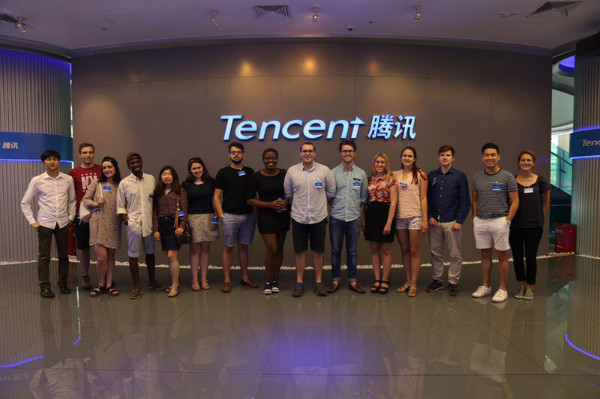By 2016 Yenching scholar Rexroad Simons
From May 27 to 29, the Yenching Academy’s Venturing Into China: Entrepreneurial Innovation in the 21st Century course had the pleasure of visiting Shenzhen in order to better understand the current state of Chinese innovation and entrepreneurship. In the weeks prior to the trip, the class was divided into three groups covering a distinct aspect of innovation in China: government investment, the sharing economy and frontier technologies. The trip was then designed to introduce us to how exactly such innovation areas were implemented in practice in one of the fastest growing technology hubs in Mainland China. In fact, the course itself was innovative, with the class structure and syllabus designed by YCA students along with our professor Dongming Chen. Professor Chen was instrumental in designing an interesting and engaging trip through Shenzhen, but also in making sure in connected with the broader themes of the entire course.
The sites visited includes Tencent, Big Gene (the largest gene sequencing facility in the world), DJI (the world’s largest drone manufacturer), the Shenzhen City Museum, and the Qianhai Shenzhen Youth Dream Factory (a startup and innovation incubator). At Tencent, the class was introduced to the company’s major product areas including WeChat, QQ, and more broadly, the usage of big data in order to better connect both Shenzhen and Mainland China with the rest of the world. The highlight of the site visit was an interactive map designed to quantify the total number of QQ and WeChat users located globally. The numbers were staggering, with close to 1 billion people globally currently on the WeChat platform. Tencent also explained that such a large amount of users also generates a plethora of data that can be used both internally and by other companies in order to design products and services better suited to reach the Chinese market. Their major innovation was connecting the company into the daily lives of the average user without them even noticing. You pay for your coffee through Tencent, call a DiDi through Tencent, find a movie screening with Tencent, and even can find love through Tencent’s apps. Tencent’s interconnectedness is arguably one of the cornerstones of future innovation and it was exciting to be able to witness it in person.

Although the class did not touch on genetic or scientific innovations, it was still an amazing experience to be able to visit Big Gene, the world’s largest gene sequencing facility, which just happened to be located a couple of hours outside of Shenzhen proper. At Big Gene, we were introduced to the many scientific breakthroughs that could potentially allow humans to live much longer in the near future. Genes can be both spliced and selected in order to eliminate both disease traits and mutations than can cause life-threatening disorders. We were surprised to also learn that a team was also working on sequencing the DNA of the wooly mammoth in order to try and bring it back from extinction (although this may be far in the future). Big Gene’s campus was also home to model gardens and vegetable fields filled with plants that were genetically designed to be “perfect” in both appearance, taste, and adaptability. The visit ended with a photograph in front of a life sized replica in front of a wooly mammoth that may soon be walking the frozen tundra of China and the rest of the world. It was certainly a photograph we won’t soon forget.

The rest of the trip was highlighted by a visit to a flagship store of DJI (the world’s largest drone manufacturer), the Shenzhen City Museum, and one of the city’s largest tech and innovation incubators located in the Qianhai region. The visit to DJI represented the most hands on part of the journey, with the company’s representatives demonstrating drones ranging from those that could fit in the palm of your hand to others designed on an industrial scale to help film some of Hollywood’s biggest movies and shows. And, just before heading to the airport, we were also able to briefly visit Shenzhen’s Youth Dream Factory, a startup incubator designed to attract and support more domestic and foreign entrepreneurs within the city’s ecosystem. The incubator even had co-living spaces that we were surprised to find resembled luxury apartments compared to our dorms back in Beijing. But, some in the group, including Professor Chen, questioned whether they would be able to organically replicate the startup culture that has made areas such as Silicon Valley, Europe, and Israel the world’s innovation and technology hubs.


Overall, we left Shenzhen with a sense that the city stands on the brink of becoming a global technology hub. Previously, the city was just known for being a hardware center that happened to be close to Hong Kong, a global economic powerhouse. But each of the site visits and experiences we had illustrated that the city is beginning to diversify both economically and socially in order to better meet new domestic and global market demands. Since Chinese opening and reform began in the late 1970s, Shenzhen has transformed from a small fishing village to one of the globe’s fastest growing economic centers, thanks in no small part to heavy reliance on economic and technologically-based innovations and companies such as DJI, Tencent and Big Gene. However, we didn’t leave the trip with all the answers regarding Chinese innovation. Shenzhen represented the immense challenges that China faces transforming its economy to one that is consumer-focused, innovative, world-changing and sustainable in the long term. Innovation is innovation because there are no guarantees of success. But, both the challenges and the unknown of the future present a perfect opportunity for YCA students to make an impact on both their home country and China’s innovation economy. So, don’t be surprised if you find a number of YCA grads living and working in Shenzhen in the near future shaping the innovative direction of the entire world.